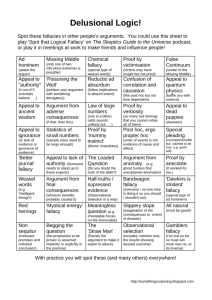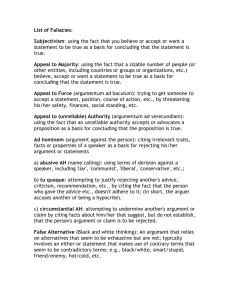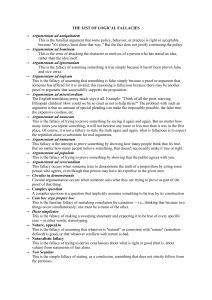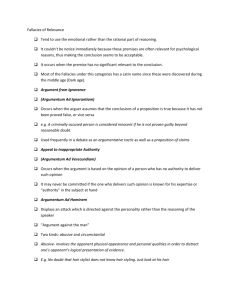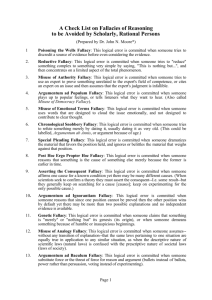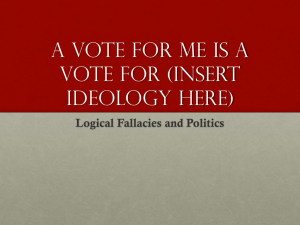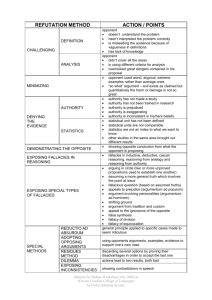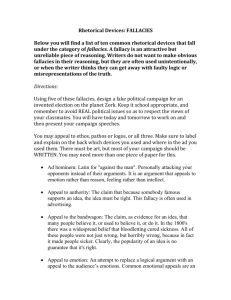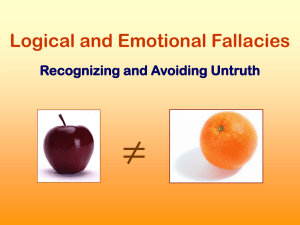SASEnglish11MidtermReviewSheet0809.doc
advertisement
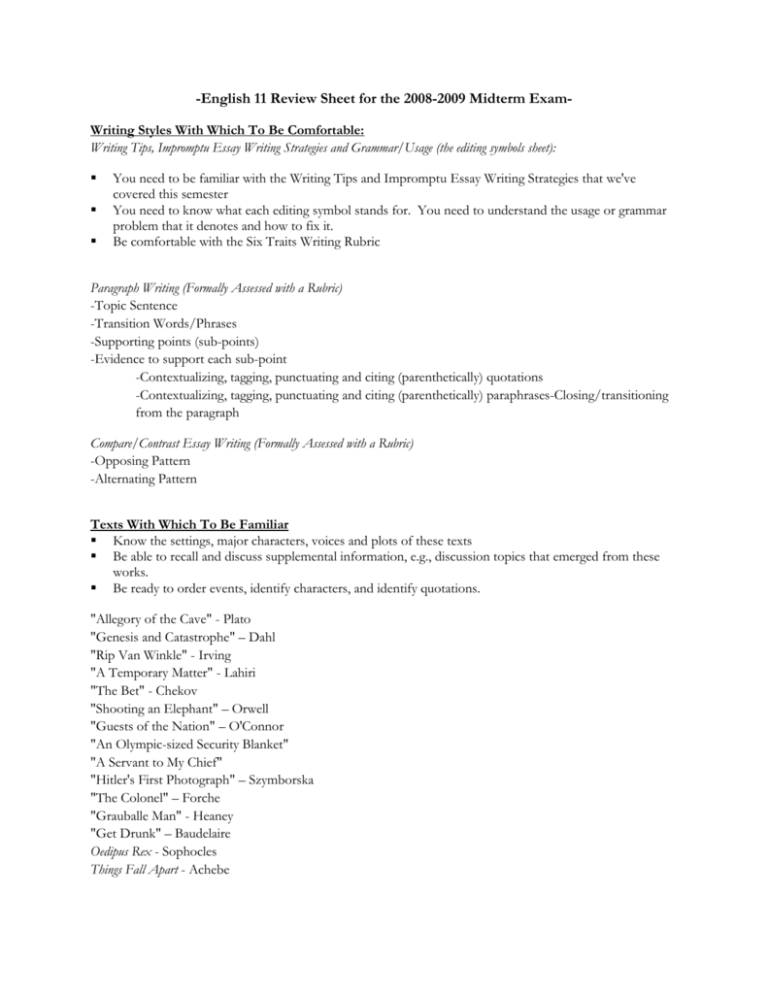
-English 11 Review Sheet for the 2008-2009 Midterm ExamWriting Styles With Which To Be Comfortable: Writing Tips, Impromptu Essay Writing Strategies and Grammar/Usage (the editing symbols sheet): You need to be familiar with the Writing Tips and Impromptu Essay Writing Strategies that we've covered this semester You need to know what each editing symbol stands for. You need to understand the usage or grammar problem that it denotes and how to fix it. Be comfortable with the Six Traits Writing Rubric Paragraph Writing (Formally Assessed with a Rubric) -Topic Sentence -Transition Words/Phrases -Supporting points (sub-points) -Evidence to support each sub-point -Contextualizing, tagging, punctuating and citing (parenthetically) quotations -Contextualizing, tagging, punctuating and citing (parenthetically) paraphrases-Closing/transitioning from the paragraph Compare/Contrast Essay Writing (Formally Assessed with a Rubric) -Opposing Pattern -Alternating Pattern Texts With Which To Be Familiar Know the settings, major characters, voices and plots of these texts Be able to recall and discuss supplemental information, e.g., discussion topics that emerged from these works. Be ready to order events, identify characters, and identify quotations. "Allegory of the Cave" - Plato "Genesis and Catastrophe" – Dahl "Rip Van Winkle" - Irving "A Temporary Matter" - Lahiri "The Bet" - Chekov "Shooting an Elephant" – Orwell "Guests of the Nation" – O'Connor "An Olympic-sized Security Blanket" "A Servant to My Chief" "Hitler's First Photograph" – Szymborska "The Colonel" – Forche "Grauballe Man" - Heaney "Get Drunk" – Baudelaire Oedipus Rex - Sophocles Things Fall Apart - Achebe Literary Concepts With Which To Be familiar: Be able to identify these elements, used them and talk about their effects. Commentary Wheel Parts Allegory Dialogue Mood Allusion Foreshadowing Symbol Denotation Connotation Characterization Direct Characterization Indirect Characterization Situational Irony Local Color Plot Chart Conflicts Greek Stuff Tragedy Tragic Flaw Tragic Irony Choregos Sophocles Aeschylus Euripides Chorus Prologue Parodos Episode Stasimon Exodos Theatron Orchestra Parados Ecceclyma Thymele Skene Deus Ex Machina Speech Unit Parallelism Antithesis Anastrophe Parenthesis Ellipsis Asyndeton Alliteration Assonance Anaphora Epistrophe Anadiplosis Climax Antimetabole Chiasmus Polyptoton Metaphor Simile Synecdoche Metonymy Anthimeria Pun Personification Hyperbole Litotes Rhetorical Questions Irony Onomatopoeia Oxymoron Paradox Fallacy of Emotive Language Fallacy of Composition Fallacy of Division Fallacy of Vicious Abstraction Argumentum Ad Misericordium (The Appeal to Pity) Argumentum Ad Verecundiam (The Appeal to Prestige) Argumentum Ad Baculum (The Appeal to Force) Argumentum Ad Hominem (Appeal to Personal Ridicule) Argumentum Ad Populum (Appeal to the Masses) False Cause (Post Hoc) Non Sequitur (It Does Not Follow) Petitio Principii (Begging the Question) Tu QuoQue (You Yourself Do It) Fallacy of Misplaced Authority False Analogy Pathetic Fallacy (Anthropomorphism) Vocabulary Ring Vocabulary You are responsible for knowing the parts of speech, definitions and spellings of these words. Unit One 1) 2) 3) 4) 5) 6) 7) 8) 9) 10) 11) 12) 13) 14) 15) 16) 17) 18) 19) 20) Approbation Assuage Coalition Decadence Elicit Expostulate Hackneyed Hiatus Innuendo Intercede Jaded Lurid Meritorious Petulant Prerogative Provincial Simulate Transcend Umbrage Unctuous Unit Four 1) Affable 2) Aggrandize 3) Amorphous 4) Aura 5) Contraband 6) Erudite 7) Gossamer 8) Infer 9) Inscrutable 10) Insular 11) Irrevocable 12) Propensity 13) Querulous 14) Remonstrate 15) Repudiate 16) Resilient 17) Reverberate 18) Scurrilous 19) Sedulous 20) Sleazy Unit Two 1) Ameliorate 2) Aplomb 3) Bombastic 4) Callow 5) Drivel 6) Epitome 7) Exhort 8) Ex officio 9) Infringe 10) Ingratiate 11) Interloper 12) Intrinsic 13) Inveigh 14) Lassitude 15) Millennium 16) Occult 17) Permeate 18) Precipitate 19) Stringent 20) Surmise Unit Three 1) Abominate 2) Acculturation 3) Adventitious 4) Ascribe 5) Circuitous 6) Commiserate 7) Enjoin 8) Expedite 9) Expiate 10) Ferment 11) Inadvertent 12) Nominal 13) Noncommittal 14) Peculate 15) Proclivity 16) Sangfroid 17) Seditious* 18) Tenuous 19) Vitriolic 20) Wheedle Unit Five 1) 2) 3) 4) 5) 6) 7) 8) 9) 10) 11) 12) 13) 14) 15) 16) 17) 18) 19) 20) Unit Six 1) 2) 3) 4) 5) 6) 7) 8) 9) 10) 11) 12) 13) 14) 15) 16) 17) 18) 19) 20) Amnesty Autonomy Axiomatic Blazon Caveat Equitable Extricate Flinch Flout Factious Precept Salutary Scathing Scourge Sepulchral Soporific Straitlaced Transient Unwieldy Vapid Anomalous Aspersion Bizarre Brusque Cajole Castigate Contrive Demagogue Disabuse Ennui Fetter Heinous Immutable Insurgent Megalomania Sinecure Surreptitious Transgress Transmute Vicarious Word Web Vocabulary You are responsible for knowing these familiar parts. You should be able to identify them within words and understand how they relate to the definitions of the words. You should be able to use these roots to form new words. interceder meritorious simulare trans scandere umbra tom gratia mill anni/enni per/meatstring/strict/strain circ com miser in ad vert nom pro clivus gran ize a/an morph ous contra band scrut able insula ir voc auto nomo equi cept/capt/ceive/ceit sal trans itiner/it, anamalo dem agogue im mut able megalo mania gress


